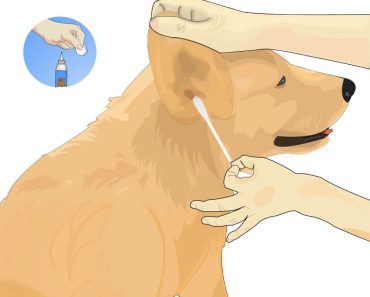
Deciding whether to neuter or spay a Golden Retriever can be a difficult decision.
You may want to give your Golden the best life possible, but you may be unsure which path to take. The abundance of contradictory advice can make the decision even more difficult.
In this article, we’ll look at the advantages and disadvantages of spaying and neutering, how to care for your dog after the procedure. as well as potential substitutes.
By the end, you’ll have a better understanding of your options, allowing you to make the best decision for you and your adorable companion.
Table of Contents
What is the Difference Between Spay and Neuter a Golden Retriever?
Spaying and neutering are surgical treatments that prevent your pet from reproducing or having puppies. Female dogs are spayed when their reproductive organs (ovaries and uterus) are removed. Male dogs, on the other hand, are neutered after their testicles are removed.
Should I Spay or Neuter My Golden Retriever?
The decision to spay or neuter your Golden Retriever is a big one that should not be taken lightly. Before making a decision, consider your dog’s age and gender, the risks and benefits of sterilization, and your lifestyle.
While there is no one-size-fits-all solution, it is always best to consult with a veterinarian who is familiar with the breed or the most recent studies on sterilization and Golden Retrievers.
Potential Risks of Spaying and Neutering a Golden Retriever
When considering spaying or neutering your golden retriever, it’s important to be aware of the potential risks and complications that may arise. These can include:
Surgical Complications:
While spaying and neutering surgeries are common and typically safe, there is always a risk of complications such as bleeding, infection, or adverse reactions to anesthesia.
Hormonal Changes
Removing the reproductive organs can result in changes in hormone levels that may affect your dog’s behavior, metabolism, and overall health.
Weight Gain
Spaying or neutering can slow down your dog’s metabolism, which may lead to weight gain if not properly managed through diet and exercise.
Joint Problems
Studies have suggested that spaying and neutering may be associated with an increased risk of joint problems such as hip dysplasia and arthritis, especially if the surgery is performed at a young age.
What are the benefits of spaying or neutering your Golden Retriever?
Spaying or neutering Golden Retrievers has some advantages that are worth considering.
neutering a Male Golden Retriever
If an intact female golden retriever is present in the household, neutering a male golden ensures he cannot produce puppies, making it easier to prevent unplanned litters of puppies.
Neutered dogs are also less interested in female dogs, which reduces their obsessive sniffing and pulling. They are also less likely to develop testicular cancer, benign prostatic enlargement, or have a perineal hernia.
Spaying a Female Golden Retriever
Spaying a female Golden Retriever avoids the chance of unwanted litters of puppies as well as the potentially fatal uterine ailment pyometra.
Although it was previously thought that spaying reduced the risk of mammary cancer, recent studies have called this into question, and more research is needed.
Nonetheless, spaying provides owners with peace of mind when it comes to accidental pregnancies and pyometra. Furthermore, a 2021 study suggested that pyometra may have a genetic component, indicating that being intact may not be the only risk factor.
When to Neuter or Spay a Golden Retriever?
Until recently, veterinarians suggested spaying and neutering dogs to prevent them from reproducing. However, it is now recommended that female dogs wait until their first heat cycle to fully mature. This is most frequent in Golden Retrievers between the ages of 6 and 18 months, with 9 to 15 months being the most common.
Experts advise waiting at least 18 months before considering spaying or neutering your Golden. This enables children to experience their own version of puberty.
Furthermore, a recent study found that delaying neutering until after one year of age can reduce the risk of bone and joint problems. Waiting until after the first heat cycle can also aid in the maturation of the urinary tract and reduce the risk of infection.
How Much Does It Cost to Spay or Neuter a golden retriever?
The cost of spaying or neutering your dog varies depending on the size and age of your dog, where you live, and the health of your dog.
Depending on the clinic or vet you choose, the cost of spaying your dog can range from $40 to $400. Spaying is more expensive for dogs who are in season, pregnant, or overweight.
Because the surgery is less invasive, neutering a dog is often less expensive than spaying a dog. Neutering costs $75 to $250 on average, with low-cost clinics charging as little as $20-$40.
However, if your dog has cryptorchid testes (testes that haven’t dropped properly), the surgery will be more invasive and cost the same as a spay. When selecting a clinic or veterinarian, it is critical to compare prices and evaluate the quality of care provided.
How to care for your golden retriever after spay/neuter surgery
If you’ve recently had your Golden retriever spayed or neutered, you must know how to care for them while they’re healing. Follow these tips to ensure proper healing:
- Prevent them from jumping on or off furniture for at least two weeks after surgery to keep them calm and comfortable.
- Incisions should be checked regularly to ensure proper healing. Contact your veterinarian right away if you notice any signs of infection.
- Bathe your Golden retriever for at least ten days after the procedure to avoid irritating their incisions.
- To keep your dog from licking or biting its incisions, consider using a protective inflatable collar.
- Lastly, If you notice any changes in your dog’s behavior following surgery, such as a loss of appetite or increased lethargy, consult your veterinarian about pain medication.
Alternatives To Spaying And Neutering A Golden Retriever
There are a few alternatives to spaying and neutering available, but they are not as widely used or as effective. Vasectomy and hysterectomy are two options to consider.
A vasectomy is a surgical procedure used to prevent male dogs from reproducing. The vet will cut and tie off the sperm tubes, but the testicles will not be removed, making the procedure less invasive than neutering.
However, a vasectomy only prevents fertilization and not breeding behavior, and finding a veterinarian who offers this option may be difficult.
A hysterectomy is a medical procedure used to prevent female dogs from reproducing. The uterus will be removed by the veterinarian, but the ovaries will remain intact, making the procedure less invasive than spaying.
However, like vasectomy, it only prevents pregnancy and not breeding behavior, and finding a veterinarian who performs this treatment may be difficult.
FAQs About Spaying And Neutering a Golden Retriever
How long will my Golden be in pain after neutering spaying?
After a spaying or neutering operation, your Golden Retriever may experience discomfort for a few days, but it should not show signs of distress for more than a week. They should wear a cone to prevent damaging their stitches and should avoid jumping for at least two weeks after the operation.
Will spaying or neutering my Golden Retriever change its personality?
Spaying/neutering may not change the personality considerably, but some improvements like increased calmness or decreased aggression are possible.
How long will my Golden be in pain after neutering spaying?
After a spaying or neutering operation, your Golden Retriever may experience discomfort for a few days, but it should not show signs of distress for more than a week. They should wear a cone to prevent damaging their stitches and should avoid jumping for at least two weeks after the operation.
Will spaying or neutering my Golden Retriever cause weight gain?
Spaying/neutering may cause a slight amount of weight gain due to the hormones being eliminated, but it can be managed with a proper diet and exercise plan.
Is it necessary to spay or neuter my Golden Retriever if I am not planning on breeding them?
Spaying/neutering is a personal choice, but it is generally recommended for pet owners who don’t intend to breed their dogs. It can provide numerous health and behavioral benefits and help prevent dog overpopulation.
Conclusion
In conclusion, spaying and neutering your Golden Retriever is a personal decision that requires careful consideration. While there are benefits to sterilization, such as preventing unplanned litter and reducing the risk of certain health issues, there are also potential risks and complications that should not be ignored.
It is important to consult with a veterinarian who is knowledgeable about Golden Retrievers and can provide guidance on when to spay or neuter, as well as proper post-operative care.
By weighing the pros and cons and making an informed decision, you can ensure the best possible health and well-being for your beloved furry friend.






